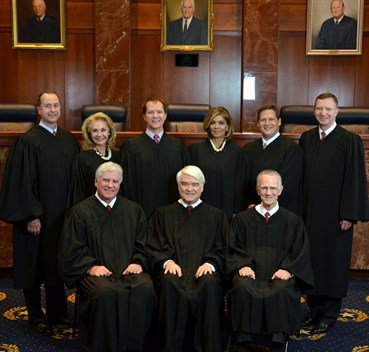Texas Supreme Court orders city to repeal or put to a vote its anti-discrimination act

The Texas Supreme Court ordered the city of Houston to repeal its controversial ordinance banning discrimination based on sexual orientation and gender identity or else put it to a popular vote in November this year.
Houston's Equal Rights Ordinance (HERO) prohibits discrimination on the basis of 15 characteristics including sex, ethnicity, religion, sexual orientation and gender identity in areas including employment, housing and private accommodations.
In a decision issued on Friday, the Supreme Court suspended the enforcement of the ordinance and asked the city council to repeal or let the voters decide.
"If the City Council does not repeal the ordinance by August 24, 2015, then by that date the City Council must order that the ordinance be put to popular vote during the November 2015 election," it said.
The decision came after Houston residents filed a referendum petition for the city council to repeal the ordinance or put in to a vote. The city council refused, saying the petition was invalid.
Executive Director Dave Welch of the Houston Area Pastor Council said Christian businesses may face a daily fine of $500 for violating the ordinance, according to CBN News.
Houston Mayor Annise Parker, who is openly gay, expressed disappointment at the state Supreme Court decision.
"Obviously, I am disappointed and believe the court is in error with this eleventh hour ruling in a case that had already been decided by a judge and jury of citizens," she said in a statement. "Nonetheless, we will proceed with the steps necessary for City Council to consider the issue. At the same time, we are consulting with our outside counsel on any possible available legal actions."
She explained that HERO is similar to measures passed by every other major city in the US and by most local corporations.
"No matter the colour of your skin, your age, gender, physical limitations, or sexual orientation, every Houstonian deserves the right to be treated equally. Our citizens fully support and understand this and I have never been afraid to take it to the voters. We will win!" she vowed.
The Alliance Defending Freedom praised the decision.
"Public officials should not be allowed to run roughshod over the right of the people to decide these types of issues, especially when the citizens of Houston clearly met all the qualifications for having their voices heard," said legal counsel Erik Stanley.
In a joint statement, the American Civil Liberties Union of Texas, Equality Texas, Texas Freedom Network, Texas Wins, Freedom for All Americans, Human Rights Campaign and Lambda Legal said, "HERO embodies Houston values, and we are confident that the voters will uphold it should it end up on the ballot this fall."
They said HERO currently protects 15 different classes, including sex, race, colour, ethnicity, national origin, age, familial status, marital status, military status, religion, disability, sexual orientation, genetic information, gender identity and pregnancy—in employment, housing and public accommodations.
"Houston cannot afford to be the one of the largest, most culturally diverse and business-friendly cities in the nation without comprehensive anti-discrimination protections. Discrimination is bad for business. But we believe Houston voters will agree that everyone who lives in and visits this great city has the right to be free from discriminatory and unequal treatment," they said.











